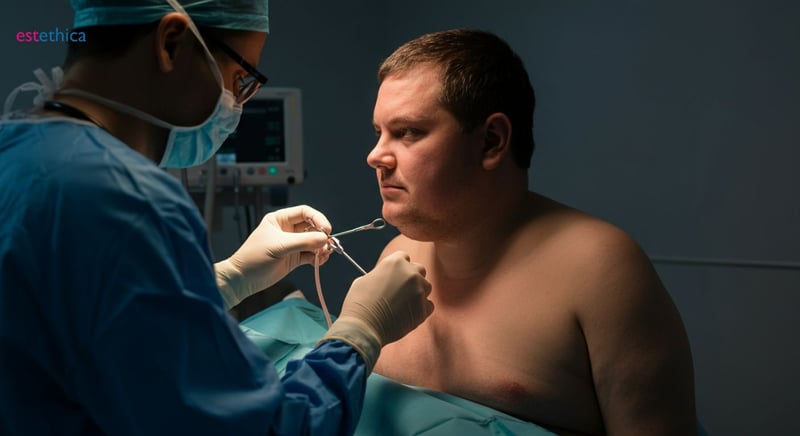Discover the Future of Bariatric Surgery
Unlock the potential of bariatric surgery with estethica's expertise and patient-first approach. Transform your life with safe, effective solutions.
The journey to weight loss can often feel overwhelming, with numerous options presenting themselves as the ultimate solution to shedding those stubborn pounds. One of the most impactful methods among these is bariatric surgery. As a life-changing medical intervention, bariatric surgery has helped countless individuals achieve significant weight loss, improved health, and a better quality of life. This guide explores the comprehensive aspects of bariatric surgery, preparation steps, its life-transforming potential through gastric bypass, and safety considerations for those pondering this crucial decision. With estethica's commitment to modern technologies and patient-centric care, transformative journeys are within your reach.
Understanding Bariatric Surgery: A Comprehensive Guide
Exploring the Types of Bariatric Surgery
Bariatric surgery, often referred to as weight loss surgery, includes several procedures aimed at altering the digestive system to aid in weight reduction. The most common types are gastric bypass, sleeve gastrectomy, adjustable gastric band, and biliopancreatic diversion with duodenal switch. Each procedure has unique mechanisms and benefits, making it crucial to understand their differences. For instance, gastric bypass involves creating a small pouch from the stomach and connecting it directly to the small intestine, significantly reducing food intake and nutrient absorption. In contrast, sleeve gastrectomy involves removing a portion of the stomach, which limits food intake and decreases hunger hormones. These surgeries not only promote weight loss but also improve conditions like type 2 diabetes and hypertension.
Factors Influencing Bariatric Surgery Decisions
Choosing the right bariatric surgery involves considering various factors, including individual health needs, lifestyle, and the potential for long-term success. It's essential to evaluate the latest bariatric surgery techniques and their suitability for different patients. For example, laparoscopic surgery, a minimally invasive technique, is often preferred due to its shorter recovery time and reduced risk of complications. Additionally, adherence to nice bariatric surgery guidelines ensures that patients receive comprehensive care tailored to their specific needs. Understanding these factors can help individuals make informed decisions about their weight loss journey.
Key Considerations for Bariatric Surgery
- Assessing the suitability of different surgical options based on health conditions.
- Understanding the impact of surgery on metabolic processes and lifestyle changes.
- Evaluating the potential for improving obesity-related conditions.
These considerations are vital in ensuring that bariatric surgery leads to sustainable health improvements. By focusing on both the physical and behavioral aspects of weight loss, patients can achieve long-term success and enhance their quality of life.
Steps to Prepare for Bariatric Surgery
- Consult with a healthcare provider to determine the most suitable procedure.
- Undergo pre-surgery evaluations to assess health status and readiness.
- Adopt lifestyle changes, such as dietary adjustments and exercise, to optimize outcomes.
Preparation is crucial for a successful bariatric surgery experience. By following these steps, patients can enhance their recovery and maximize the benefits of the procedure. Understanding the importance of preparation helps in achieving the desired weight loss and health improvements.

Preparing for Success: Steps Before Your Surgery
Essential Preoperative Assessments
Before undergoing bariatric surgery, comprehensive preoperative assessments are crucial. These evaluations include a detailed health check to identify any underlying conditions that could affect surgery outcomes. Nutritional consultations are also essential, guiding patients on dietary changes that promote healing and long-term success. For example, reducing sugar intake can help manage blood glucose levels, which is vital for recovery. Additionally, psychological evaluations ensure that patients have realistic expectations and are mentally prepared for the lifestyle changes required post-surgery. These assessments align with the nice bariatric surgery guidelines, ensuring a holistic approach to patient care.
Lifestyle Modifications for Optimal Outcomes
Adopting lifestyle modifications is a critical step in preparing for weight loss surgery. Patients are often advised to quit smoking and limit alcohol consumption, as these habits can impede healing and increase surgical risks. Engaging in a structured weight management program can also be beneficial. For instance, incorporating regular physical activity helps improve cardiovascular health, which is crucial for a smooth recovery. Some patients may undergo treatments like gastric botox to prepare the stomach for surgery, enhancing the effectiveness of the procedure. These preparatory steps not only reduce risks but also foster a supportive environment for postoperative recovery and lifestyle adaptation.
Understanding Bariatric Surgery Recovery Time
- Initial recovery typically involves a hospital stay of 2-3 days.
- Patients often resume normal activities within 4-6 weeks.
- Full recovery and adaptation to lifestyle changes can take several months.
Understanding the recovery timeline is vital for setting realistic expectations and planning for postoperative care. Adhering to the bariatric bypass surgery recovery time guidelines ensures a smoother transition to a healthier lifestyle.
Key Factors Influencing Surgery Success
- Commitment to dietary and lifestyle changes post-surgery.
- Regular follow-up appointments with healthcare providers.
- Support from family and friends to maintain motivation.
These factors play a significant role in achieving long-term success after bariatric surgery. By focusing on these elements, patients can enhance their quality of life and sustain weight loss over time.

Exploring Gastric Bypass: How It Transforms Lives
The Emotional and Social Impact of Gastric Bypass
Gastric bypass surgery not only facilitates significant weight loss but also profoundly impacts emotional and social well-being. Patients often report increased self-esteem and confidence, which can lead to improved social interactions and relationships. For example, individuals may feel more comfortable participating in social activities, leading to a more fulfilling social life. Additionally, the reduction in obesity-related stigma can enhance mental health, contributing to a more positive outlook on life. These emotional and social benefits are integral to the overall success of the surgery, as they encourage patients to maintain healthy lifestyle changes.
Understanding the Life-Altering Benefits
- Significant reduction in obesity-related diseases such as diabetes and hypertension.
- Improved life expectancy due to healthier body weight and reduced health risks.
- Enhanced psychological well-being and a greater sense of personal achievement.
The transformative effects of gastric bypass extend beyond physical health, offering patients a renewed sense of purpose and motivation. By addressing both the physical and emotional aspects of obesity, this surgery provides a comprehensive approach to improving quality of life.
Navigating the Journey Post-Surgery
- Adapting to new dietary habits and nutritional guidelines.
- Engaging in regular physical activity to maintain weight loss.
- Participating in support groups to share experiences and gain encouragement.
Post-surgery, patients embark on a journey of lifestyle changes that require dedication and support. By following the bariatric bypass surgery recovery time and adhering to nice bariatric surgery guidelines, individuals can achieve lasting success and enjoy a healthier, more active life.

Is Weight Loss Surgery Right for You? Safety Insights
Evaluating the Safety of Weight Loss Surgery
Weight loss surgery, including bariatric procedures like gastric bypass and sleeve gastrectomy, is generally considered safe when performed by experienced surgeons in accredited facilities. The complication rates are low, but potential risks such as nutritional deficiencies and bowel issues must be considered. For instance, patients might experience vitamin deficiencies post-surgery, necessitating lifelong supplementation. Additionally, adherence to the nice bariatric surgery guidelines ensures comprehensive care and minimizes risks. Understanding these safety aspects helps individuals make informed decisions about undergoing weight loss surgery.
Long-Term Success and Lifestyle Commitment
Achieving long-term success after weight loss surgery requires a strong commitment to lifestyle changes. Patients must adhere to dietary guidelines and engage in regular physical activity to maintain weight loss. Support groups and counseling play a crucial role in sustaining motivation and addressing challenges. For example, joining a support group can provide emotional encouragement and practical advice from others who have undergone similar experiences. Regular follow-ups with healthcare providers ensure that any complications are promptly addressed, aligning with the bariatric bypass surgery recovery time recommendations. This holistic approach fosters a supportive environment for lasting health improvements.
Understanding the Factors Influencing Surgery Costs
- Surgeon's experience and reputation can affect the overall cost.
- Facility accreditation and location may influence pricing.
- Pre- and post-operative care requirements can add to expenses.
While the cost of bariatric surgery is a consideration, it's important to focus on the quality of care and long-term benefits. Choosing the best bariatric surgeons near you ensures a safer procedure and better outcomes, ultimately enhancing the value of the investment in your health.
Innovative Bariatric Surgery Techniques
Excellence in Bariatric Surgery Recovery and Support
Frequently Asked Questions
What is bariatric surgery and how does it aid in weight loss?
How does gastric bypass surgery transform lives?
Is weight loss surgery safe and what are the potential risks?
What steps should be taken to prepare for bariatric surgery?
What factors influence the success of bariatric surgery?
Discover the path to your healthiest and most beautiful self with estethica's award-winning services. Contact us today for a free consultation and experience the highest standards of care and innovation in healthcare.
📞 Call Now for Your Free Consultation